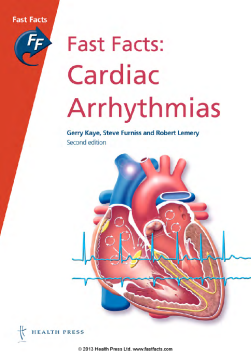
Additional Information
Book Details
Abstract
Recent progress in interventional therapies has revolutionized the management of cardiac arrhythmias, resulting in a remarkable improvement in outcomes for patients. Yet the diagnosis and management of arrhythmias are still viewed as a complex and inaccessible area of modern cardiology. Fast Facts: Cardiac Arrhythmias cuts through the technical detail to provide a better understanding of how the patient with arrhythmia presents, and how the problem should be best investigated and managed. Highlights include:
- Succinct descriptions with clear well-annotated illustrations of normal conduction and the mechanisms of arrhythmias
- A simple classification of arrhythmias based on 12-lead ECG patterns
- A comprehensive review of presenting signs and symptoms, with key questions to ask the patient
- A logical approach to investigation: predict it (history and examination), wait for it (monitoring) or provoke it (electrophysiology)
- Practical information on management options: pharmacological therapy, direct cardioversion, catheter ablation and cardiac devices (pacemakers and defibrillators)
- The latest international guidelines on atrial fibrillation and catheter and surgical ablation
- Important pharmacological updates, including the latest thinking on anticoagulation.
This highly readable handbook is a practical resource for all primary care physicians, cardiologists in training, cardiac nurses, technicians and medical students seeking a better understanding of the mechanisms of arrhythmias and the contemporary therapies available, with a view to improving patient care.
“The pictorial diagrams and EKG tracings, along with real pictures, make the book very easy to read and understand … a great resource for a quick review for anyone caring for patients with cardiac arrhythmias.”
Krishna Kancharla, MD
A welcome and important addition to the Fast Facts series … Having kept faithful to the popular formula of this series the authors have produced an excellent synopsis of this topic that will be accessible to medical students, health care professionals, primary care physicians and cardiology trainees alike … ideal for quick reference. The content is succinct and well thought out, particularly with regard to the level of detail. The first few chapters … are approached in a very reader friendly manner with helpful tables along the way. One of the highlights of the book is the management chapter which gives a practical, no nonsense approach to key principles of management which, if adhered to, will serve the reader well in a difficult clinical scenario. I personally have not seen a better concise section like this in any other book and the authors should be commended for this. In summary, this is an excellent book that will appeal to anyone wishing to understand cardiac arrhythmias and their management. It is surprisingly informative for a short book and represents a time efficient way of gaining knowledge in this subject. I would not hesitate to recommend it.
Dr Shouvik Haldar, Electrophysiology Research Fellow & Cardiology Specialist Registrar
This easily readable handbook provides a comprehensive practical resource for primary care physicians, cardiologists in training, nurses, and technicians, as well as for medical students seeking an up-to-date clinical overview of the field of common arrhythmias.
I have had atrial fibrillation for a year now. I wanted to know more about this condition and I am quite satisfied with this book; clear and explanatory. It deals with other arrhythmias too.
Amazon Review
My little problem has reinforced my belief that Fast Facts are an important source of information for the management of most problems. Both the patient and family need to take control of daily management, and this may be as simple as titrating the dose of medication to dangers of the day. My current wish is to avoid fibrillation for at least 3 months and I'm sure this publication will be a help.
Dr Ray Healey, Australia
